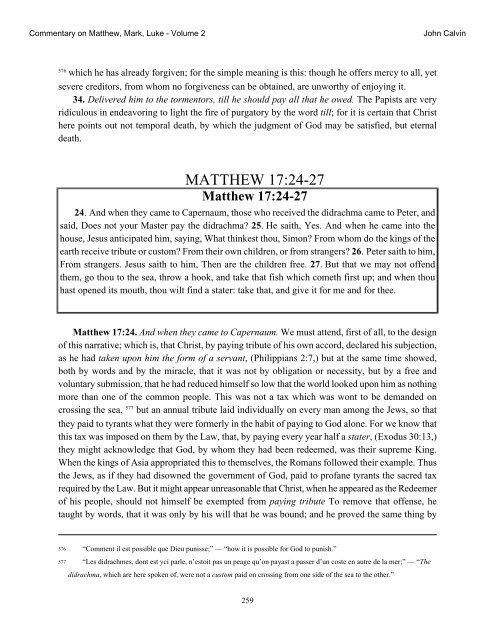Commentary on Matthew, Mark, Luke - Volume 2.pdf
Commentary on Matthew, Mark, Luke - Volume 2.pdf
Commentary on Matthew, Mark, Luke - Volume 2.pdf
You also want an ePaper? Increase the reach of your titles
YUMPU automatically turns print PDFs into web optimized ePapers that Google loves.
<str<strong>on</strong>g>Commentary</str<strong>on</strong>g> <strong>on</strong> <strong>Matthew</strong>, <strong>Mark</strong>, <strong>Luke</strong> - <strong>Volume</strong> 2<br />
576 which he has already forgiven; for the simple meaning is this: though he offers mercy to all, yet<br />
severe creditors, from whom no forgiveness can be obtained, are unworthy of enjoying it.<br />
34. Delivered him to the tormentors, till he should pay all that he owed. The Papists are very<br />
ridiculous in endeavoring to light the fire of purgatory by the word till; for it is certain that Christ<br />
here points out not temporal death, by which the judgment of God may be satisfied, but eternal<br />
death.<br />
MATTHEW 17:24-27<br />
<strong>Matthew</strong> 17:24-27<br />
24. And when they came to Capernaum, those who received the didrachma came to Peter, and<br />
said, Does not your Master pay the didrachma? 25. He saith, Yes. And when he came into the<br />
house, Jesus anticipated him, saying, What thinkest thou, Sim<strong>on</strong>? From whom do the kings of the<br />
earth receive tribute or custom? From their own children, or from strangers? 26. Peter saith to him,<br />
From strangers. Jesus saith to him, Then are the children free. 27. But that we may not offend<br />
them, go thou to the sea, throw a hook, and take that fish which cometh first up; and when thou<br />
hast opened its mouth, thou wilt find a stater: take that, and give it for me and for thee.<br />
<strong>Matthew</strong> 17:24. And when they came to Capernaum. We must attend, first of all, to the design<br />
of this narrative; which is, that Christ, by paying tribute of his own accord, declared his subjecti<strong>on</strong>,<br />
as he had taken up<strong>on</strong> him the form of a servant, (Philippians 2:7,) but at the same time showed,<br />
both by words and by the miracle, that it was not by obligati<strong>on</strong> or necessity, but by a free and<br />
voluntary submissi<strong>on</strong>, that he had reduced himself so low that the world looked up<strong>on</strong> him as nothing<br />
more than <strong>on</strong>e of the comm<strong>on</strong> people. This was not a tax which was w<strong>on</strong>t to be demanded <strong>on</strong><br />
crossing the sea, 577 but an annual tribute laid individually <strong>on</strong> every man am<strong>on</strong>g the Jews, so that<br />
they paid to tyrants what they were formerly in the habit of paying to God al<strong>on</strong>e. For we know that<br />
this tax was imposed <strong>on</strong> them by the Law, that, by paying every year half a stater, (Exodus 30:13,)<br />
they might acknowledge that God, by whom they had been redeemed, was their supreme King.<br />
When the kings of Asia appropriated this to themselves, the Romans followed their example. Thus<br />
the Jews, as if they had disowned the government of God, paid to profane tyrants the sacred tax<br />
required by the Law. But it might appear unreas<strong>on</strong>able that Christ, when he appeared as the Redeemer<br />
of his people, should not himself be exempted from paying tribute To remove that offense, he<br />
taught by words, that it was <strong>on</strong>ly by his will that he was bound; and he proved the same thing by<br />
576 “Comment il est possible que Dieu punisse;” — “how it is possible for God to punish.”<br />
577 “Les didrachmes, d<strong>on</strong>t est yci parle, n’estoit pas un peage qu’<strong>on</strong> payast a passer d’un coste en autre de la mer;” — “The<br />
didrachma, which are here spoken of, were not a custom paid <strong>on</strong> crossing from <strong>on</strong>e side of the sea to the other.”<br />
259<br />
John Calvin

















